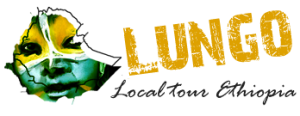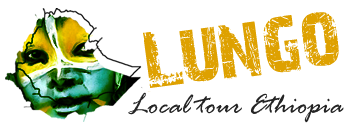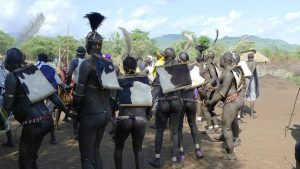The Bodi speak the Bodi language as a mother tongue, which belongs to the Nilo-Saharan language family. The Bodi or Me’en is the name of a semi-nomadic tribe leaving in the Omo valley, about 140 km from Jinka town, Ethiopian Southern town. South of the Bodi are the Mursi tribe. Although they do cultivate sorghum, maize and coffee along the banks of the Omo River, their culture is very much cattle centered. Similar to the Mursi, livestock plays an important role in marriage, divination, and name-giving rituals. The Bodi classification of cattle is complex, with over eighty words to denote different colors and patterns.

Every year, they celebrate their new year, ‘Kel’ (Bodi New year Celebration) between June and July, depending on the full moon, the rains. This celebration is a bit different than a usual new year celebration’s as the tradition is to feed young men from every Bodi village. They are feeded only with honey, cow blood and milk during 3-6 months (fatning process). They manage then to almost double their weight, being then ready for the competition. On the competition day, they arrive to the Bode King village and after the dance they are measured by the elders who then decide who is the winner and the fattest after the competition.

BODI PEOPLE: AN ANCIENT ETHIOPIAN TRIBE AND THEIR KAEL CULTURAL CEREMONY
The Bodi or Me’en is the name of a semi-nomadic tribe living in the Omo valley, about 140 km from Jinka town, southern Ethiopia. South of the Bodi are the Mursi tribe.
Bodi people on their way to a funeral, Omo Valley,Ethiopia
The Bodi speak the Bodi language as a mother tongue, which belongs to the Nilo-Saharan language family. They are pastoralists (livestock farmers) and agriculturalists.
Bodi Tribe Man And Cattle, Hana Mursi, Omo Valley, Ethiopia Along the banks of the river, they will grow sorghum, maize and coffee. They live with their cattle herds and livestock plays a large role in the

Bodi tribe youths at Salamago
Bodi tribe woman at Salamago,Omo Valley,Ethiopia
The bodis are one of the ethnic group in Ethiopia`s Omo valley that have refused to change to the modern way of life and prefers their indigenous tribal pastoral life. The bodi still engages in barter trade system. Bodi people in south Ethiopia walk for hours to reach the weekly markets, where they exchange stuff or buy some.
Similar to the Mursi, livestock plays an important role I marriage, divination, and name-giving rituals. The Bodi classification of cattle is complex, with over eight words to denote different colors and patterns. Bodi dress is simple. The women wear goatskins tied at the waist and shoulder, while men fasten a strip of cotton or bark-cloth around their

Bodi tribe girl
Bodi women likes fashion and they are fond of making tribal beautification marks on their bodies. These beautification marks (scarifications) comes in many forms as the bearer want it to be. They adorn their body with beautiful tribal bracelets.
Every year, they celebrate their new year, ‘Ka`el’ (Bodi New year Celebration) between June and July, depending on the full moon, the rains. This celebration is a bit different than a usual new year celebration’s as the tradition is to feed young men from every Bodi village. They are fed with only honey, cow blood and milk during 3-6 months (fattening process).

To celebrate their new year called the Kael, the Bodi tribe in south Ethiopia, Omo valley, kill a cow. They use a huge stone and bang the head….then they open the cow, read the intestines, and take the blood to drink it… to celebrate their new year called the Kael, the Bodi tribe in south Ethiopia, Omo valley, kill a cow. They use a huge stone and bang the head….then they open the cow, read the intestines, and take the blood to drink.
To celebrate their new year Ka`el, the Bodi tribe in south Ethiopia, kill a cow. They use a huge stone and bang the head….then they open the cow, rip out the intestines for divination, and take the blood to drink it The feeding on the blood mixed with honey and cow milk enables them to almost double their weight,which makes them ready for the competition. Contestants for this competition goes naked to make them eligible to participate.

On the competition day, the contestants and the village folks assembles at the Bode King village. Traditional bodi tribal warrior dances are performed to the delight of on-lookers. After the dance, the bodies of the contestants are measured by the elders who then decide who is the fattest winner.
When a member of Bodi tribe dies. The woman of the tribe shout to the spirits and chant of his/her death to bring the soul to peace. The Bodi men perform ceremonial death procession and will keep the body of the deceased safe for 3 days. After this, the tribe will gather together and eat as a sign of respect, and to ensure passing into the next world.

Bodi tribe are the most friendlier,shy and accommodating people. Amongst the tribes in Ethiopia`s Omo Valley, Bodi are very have very beautiful women whiles their men tend to be very fat with big feets. The Bodi have a natural flair for fashion and they have one of the most diverse magnificent hairstyles (hair-cut) among the indigenous tribes in Omo Valley.

Bodi tribe people threatened by the Ethiopian Government
Plantations are built and made possible by the land grabbing leaded by the Ethiopian Authority like in Hana Mursi or Koka villages; to achieve its goals, Ethiopian government planned to displace local population towards settlements areas in new villages; the Omo Valley houses multiple different tribes like Hamer, Mursi, Nyangatom, Bodi, Suri, Karo, Dassanech, Bana, Tsamay, Erbore, Menit with rich and primary lifestyle and practices; these tribes are threaten by the army into giving up the land where their ancestors lived and abandoned their traditional lifestyle; some tribes have surrounded and accepted to move in the settlement areas; others refuse to leave those fertile lands and drop their culture and traditions, they came into resistance with their limited means at their disposal,; the government allocates those lands to foreign companies (Malaysian, Saudis, Indians…) who all rent land at the paltry cost of one euro per hectare a year; this governmental practice is seen by the opponents as the result of a corruption system; the lifestyle of the local tribes are endangered, they depend on the crops and their cattle; without land to graze for their cows, in the settlement area, they will face the inherent problems of urban life (aids, disease, alcohol, loss of social reference); the situation is worrying as the increase in acts of intimidation (arbitrary imprisonment, threats) and murders in the area.


